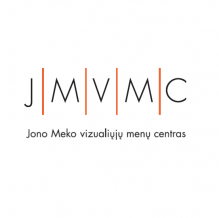The Jonas Mekas Visual Arts Center (JMVAC) in Vilnius, Lithuania proudly announces its premier exhibition, The Avant-Garde: From Futurism to Fluxus, which opens to the public on November 4, 2007 and runs through February 3, 2008. The exhibition highlights the history of the avant-garde through some of its most pivotal figures and a wide array of mediums including film, film stills, installation, Fluxus objects and documents, sculpture, video, and poetry, which cooperatively stimulated new ways of thinking about art, culture, and society. Furthermore, the exhibition represents a celebratory homecoming for two of Lithuania’s most prolific artists: pioneering avant-garde filmmaker Jonas Mekas and George Maciunas, the impresario and “Chairman” of the 1960’s international art movement Fluxus.
Kazys Binkis, the Futurist poet and writer whose literary activity awakened Lithuania to avant-garde philosophy and aesthetics holds an honorary place in the program. His books, poems, and manuscripts are a testament to his enigmatic persona and contribution to the progression of Lithuanian art and culture.
Jonas Mekas “The Godfather of American Avant-Garde Cinema” continues his groundbreaking work through new installations in which the still and moving image conjoin in a spectacular multimedia presentation. His Collection of 40 Short Films, recently on view at P.S.1 Contemporary Art Center in New York is shown on monitors and wall projections together with 40 film stills extracted from this riveting series.
The installations demonstrate Mekas’ formal innovations as well as his importance as a documentarian. Among the colorful and well known personalities who appear in his films are: John Lennon, Salvador Dali, George Maciunas, Richard Serra, Nam June Paik, Andy Warhol, and Allen Ginsberg, reminding us that Mekas’ films represent some of the best historical footage of the avant-garde in existence from the 1960’s to the present. Also featured will be Zefiro Torna: Scenes From the Life of George Maciunas (1992), Mekas’ cinematic homage to his longtime friend and collaborator. Complementing the film are 40 film stills that Mekas crafted specially for the exhibition.
Essential works have been selected from the Center’s recently acquired Fluxus collection. Maciunas’ readymade sign No Smoking (1963/1973), his collaborative work with George Brecht realized through Iced Dice (1964), and Yoko Ono’s Do It Yourself (1966) demonstrate the movement’s emphasis on humor and desire to construct art from everyday objects and actions. The 80 Wooster Street documents reveal the nuts and bolts behind Maciunas’ vision to convert the industrial buildings of New York’s downtown SoHo neighborhood into the legendary Fluxhouse Artist Cooperatives, which earned him the title of “Father of SoHo.” Also on view will be Nam June Paik’s conceptual video installation Real Plant/Live Plant (1978) and video sculpture TV Rodin (1975). Larry Miller’s Some Fluxus (1991) showcases key Fluxus performances incorporating segments from Maciunas’ final interview in which Maciunas explains his lifelong fascination with charts, systemization, and humor. Shigeko Kubota’s Fluxus SoHo Tour (1994) offers another intimate look at Maciunas as he and Fluxus members travel the streets of SoHo speaking in their native languages. While the international Fluxus movement as a whole is the subject of Lars Movin’s The Misfits: 30 Years of Fluxus (1993), Maciunas’ comprehensive production Fluxfilm Anthology (1962-70) encapsulates the group’s critical yet playful engagement with film tradition.
Jonas Mekas specifically curates a roster of films by visionaries of avant-garde cinema. So honored are Luis Buñuel’s revolutionary surrealist film Un Chien Andalou (1929) written in collaboration with Salvador Dalí, Marcel Duchamp’s characteristically Dada film Anemic Cinema (1926), Hans Richter’s Dada masterpiece Rhythmus 21 (1921), Fernand Léger’s pioneering cinematic testament Ballet Mécanique (1924), and Peter Kubelka’s experimental, abstract film Arnulf Rainer (1960).
“Jonas Mekas was born and raised in Lithuania. As a renowned poet in his native country, he pushed the boundaries of language to its most creative edges. After he was forced to leave Lithuania during World War II, Jonas found a new home in New York and continued paving new avant-garde frontiers. This time, he chose the universal language of cinema as his area of communication. Jonas’ return to Lithuania is not only a home-coming, but a continuation of new realities”, stated Artūras Zuokas, the Chairman of the Board of the Jonas Mekas Visual Arts Center.
This landmark exhibition culminates in the historic moment when Lithuania assumes the esteemed position of European Capital of Culture in 2009. Such international recognition attests to the fact that a vibrant new period in Lithuanian culture has already emerged.
The exhibition will be accompanied with a full-page color catalogue with essays by R. Bruce Elder, P. Adams Sitney, Amy Taubin, Mari Dumett, Julia Robinson, Carolina Carrasco, Astrit Schmidt-Burkhardt, and Hollis Melton.
Jonas Mekas Visual Arts Center, Ms. Maya Stendhal, and Mr. Harry Stendhal – exhibition curators Ms. Mari Dumett – Co-curator Fluxus Documents.

Sun Jiazheng, the Minister of Culture of People’s Republic of China congratulates J mekas on the opening of the first exhibition at the JMVAC

J. Mekas and the head of the JMVAC Kristijonas Kucinskas give thanks to the sponsor of the center – the chief executive officer of the company “Ranga IV investicijos” Laimutis Pinkevicius

J. Mekas is happy to welcome a famous Japanese artist, one of the leaders and founders of the FLUXUS movement – Shigeko Kubota

Thomas Krens, the head of the Guggenheim Museum and Arturas Zuokas, president of the board of the JMVAC

Opening of the exhibition: The Mayor of Vilnius J. Imbrasas, Jonas Mekas and Prime Minsiter of Lithuania Gediminas Kirkilas









